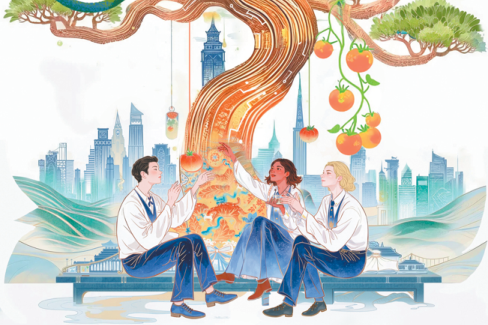Change on cards in this Year of Rooster

During a New Year news conference in Ise, a city in central Japan's Mie prefecture, Japanese Prime Minister Shinzo Abe said he was not thinking of dissolving the House of Representatives for an election. He referred to this year being a Year of the Rooster in the Chinese zodiac, and said that such years "have frequently served as major political turning points".
Indeed, the political ups and downs in several years of rooster, such as 1957, 1969, 1993 and 2005, have been significant for Japan.
Nobusuke Kishi, Abe's grandfather, became Japan's prime minister and spoke to the US House and Senate in separate gatherings in 1957. A co-signer of the declaration of war against the United States in 1941, Kishi was nonetheless leader of the United States' most important Pacific ally in the early years of the Cold War.
Japanese prime minister Eisaku Sato dissolved the House of Representatives, or the Lower House, in 1969 after clinching a deal on the return of Okinawa with the United States, which had occupied the island following Japan's surrender in 1945.
Abe himself was first elected to the Lower House of Japan's parliament in 1993. In that year the Liberal Democratic Party, which Abe belongs to, lost an election for the first time after World War II.
And Japanese prime minister Junichiro Koizumi called a snap election in 2005 asking for a mandate for his blueprint on postal privatization. His LDP won a sweeping victory. But his annual visits to the Yasukuni Shrine where 14 Japanese Class-A war criminals are enshrined along with the millions of the country's war dead, destroyed much of Japan's standing with its neighbors. His resignation in 2006 was followed by years of a revolving-door premiership in Japan.
Abe has not been good to his words on New Year's Day as he dissolved the Lower House on Sept 28, which will make this Year of the Rooster another turning point for Japan.
Following Abe's announcement, the previous largest opposition party, the Democratic Party, disbanded. Its conservative members have joined the new Party of Hope, led by Tokyo Governor Yuriko Koike, while its left-leaning members have established a new party, the Constitutional Democratic Party; others are running in the election as independents. The rest of Japan's opposition camp is too weak and fragmented to make waves, giving the LDP an advantage.
Abe is likely to survive his gamble on a snap election as media polls show that the LDP-Komeito coalition is heading for a big win next Sunday. He has said he will step down if the ruling parties fail to grab a majority, or 233, of the 465-seats in the Lower House.
The Party of Hope will probably be the second-largest winner but it is unlikely to upend the LDP. However, the rise of the new party, which is in favor of revising Japan's Constitution-including the war-renouncing Article 9, will give Abe a shot in the arm for his pet project.
In an interview with the Yomiuri Shimbun published on May 3, the country's Constitution Memorial Day, which marks the promulgation of the document that has shaped Japan's domestic and international politics since 1947, Abe described the 70th anniversary of Japan's Constitution this year as a "ripe opportunity" to revise it. He wants a new Constitution to come into effect in 2020.
The pledge to revise the Constitution has, for the first time, made it to the LDP election platform.
The ruling coalition has a two-thirds supermajority in the Upper House. Now Japanese media predict that the pro-revision parties are on track to win more than two-thirds of the seats in the Lower House. Amending the Constitution requires a two-thirds majority in both chambers of Japan's parliament and a majority of public support in a national referendum.
The result of the election in this Year of the Rooster looks like heralding the beginning of a fundamental change in Japan that will worry many people in and outside the country.
The author is China Daily Tokyo bureau chief.































